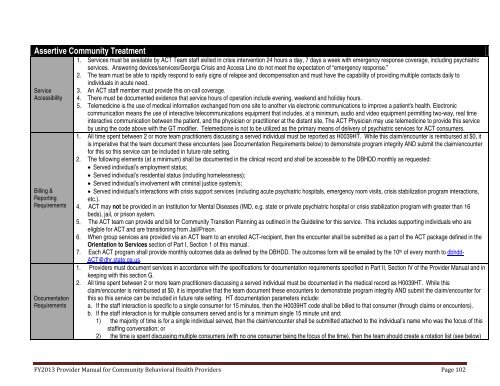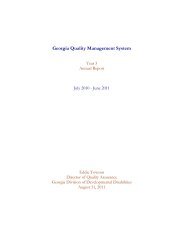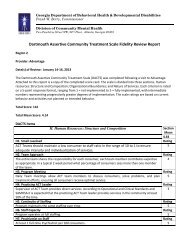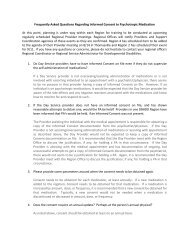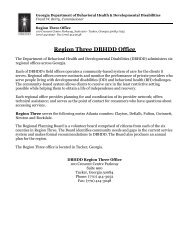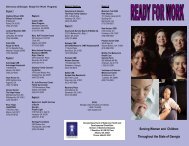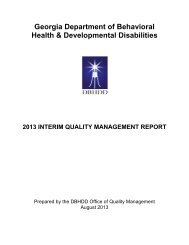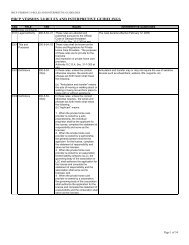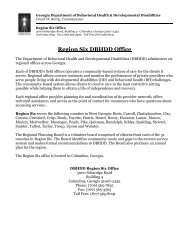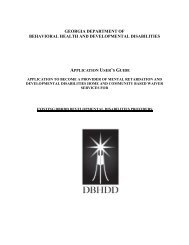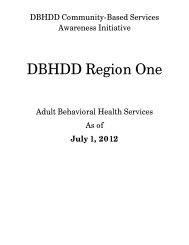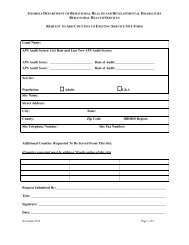PART I - Department of Behavioral Health and Developmental ...
PART I - Department of Behavioral Health and Developmental ...
PART I - Department of Behavioral Health and Developmental ...
Create successful ePaper yourself
Turn your PDF publications into a flip-book with our unique Google optimized e-Paper software.
Assertive Community TreatmentServiceAccessibilityBilling &ReportingRequirementsDocumentationRequirements1. Services must be available by ACT Team staff skilled in crisis intervention 24 hours a day, 7 days a week with emergency response coverage, including psychiatricservices. Answering devices/services/Georgia Crisis <strong>and</strong> Access Line do not meet the expectation <strong>of</strong> “emergency response.”2. The team must be able to rapidly respond to early signs <strong>of</strong> relapse <strong>and</strong> decompensation <strong>and</strong> must have the capability <strong>of</strong> providing multiple contacts daily toindividuals in acute need.3. An ACT staff member must provide this on-call coverage.4. There must be documented evidence that service hours <strong>of</strong> operation include evening, weekend <strong>and</strong> holiday hours.5. Telemedicine is the use <strong>of</strong> medical information exchanged from one site to another via electronic communications to improve a patient's health. Electroniccommunication means the use <strong>of</strong> interactive telecommunications equipment that includes, at a minimum, audio <strong>and</strong> video equipment permitting two-way, real timeinteractive communication between the patient, <strong>and</strong> the physician or practitioner at the distant site. The ACT Physician may use telemedicine to provide this serviceby using the code above with the GT modifier. Telemedicine is not to be utilized as the primary means <strong>of</strong> delivery <strong>of</strong> psychiatric services for ACT consumers.1. All time spent between 2 or more team practitioners discussing a served individual must be reported as H0039HT. While this claim/encounter is reimbursed at $0, itis imperative that the team document these encounters (see Documentation Requirements below) to demonstrate program integrity AND submit the claim/encounterfor this so this service can be included in future rate setting.2. The following elements (at a minimum) shall be documented in the clinical record <strong>and</strong> shall be accessible to the DBHDD monthly as requested:• Served individual’s employment status;• Served individual’s residential status (including homelessness);• Served individual’s involvement with criminal justice system/s;• Served individual’s interactions with crisis support services (including acute psychiatric hospitals, emergency room visits, crisis stabilization program interactions,etc.).4. ACT may not be provided in an Institution for Mental Diseases (IMD, e.g. state or private psychiatric hospital or crisis stabilization program with greater than 16beds), jail, or prison system.5. The ACT team can provide <strong>and</strong> bill for Community Transition Planning as outlined in the Guideline for this service. This includes supporting individuals who areeligible for ACT <strong>and</strong> are transitioning from Jail/Prison.6. When group services are provided via an ACT team to an enrolled ACT-recipient, then the encounter shall be submitted as a part <strong>of</strong> the ACT package defined in theOrientation to Services section <strong>of</strong> Part I, Section 1 <strong>of</strong> this manual.7. Each ACT program shall provide monthly outcomes data as defined by the DBHDD. The outcomes form will be emailed by the 10 th <strong>of</strong> every month to dbhdd-ACT@dhr.state.ga.us.1. Providers must document services in accordance with the specifications for documentation requirements specified in Part II, Section IV <strong>of</strong> the Provider Manual <strong>and</strong> inkeeping with this section G.2. All time spent between 2 or more team practitioners discussing a served individual must be documented in the medical record as H0039HT. While thisclaim/encounter is reimbursed at $0, it is imperative that the team document these encounters to demonstrate program integrity AND submit the claim/encounter forthis so this service can be included in future rate setting. HT documentation parameters include:a. If the staff interaction is specific to a single consumer for 15 minutes, then the H0039HT code shall be billed to that consumer (through claims or encounters).b. If the staff interaction is for multiple consumers served <strong>and</strong> is for a minimum single 15 minute unit <strong>and</strong>:1) the majority <strong>of</strong> time is for a single individual served, then the claim/encounter shall be submitted attached to the individual’s name who was the focus <strong>of</strong> thisstaffing conversation; or2) the time is spent discussing multiple consumers (with no one consumer being the focus <strong>of</strong> the time), then the team should create a rotation list (see below)FY2013 Provider Manual for Community <strong>Behavioral</strong> <strong>Health</strong> Providers Page 102


